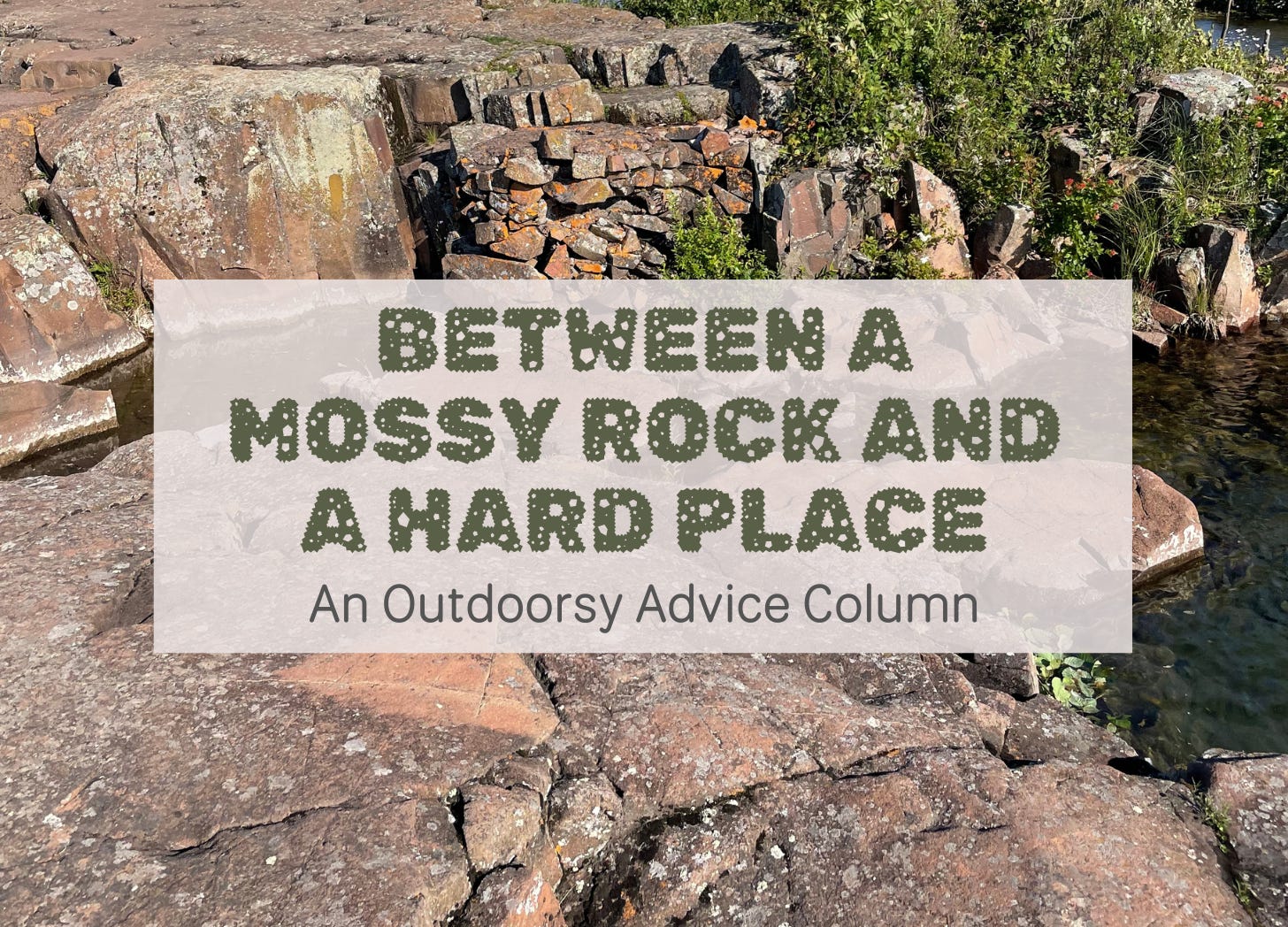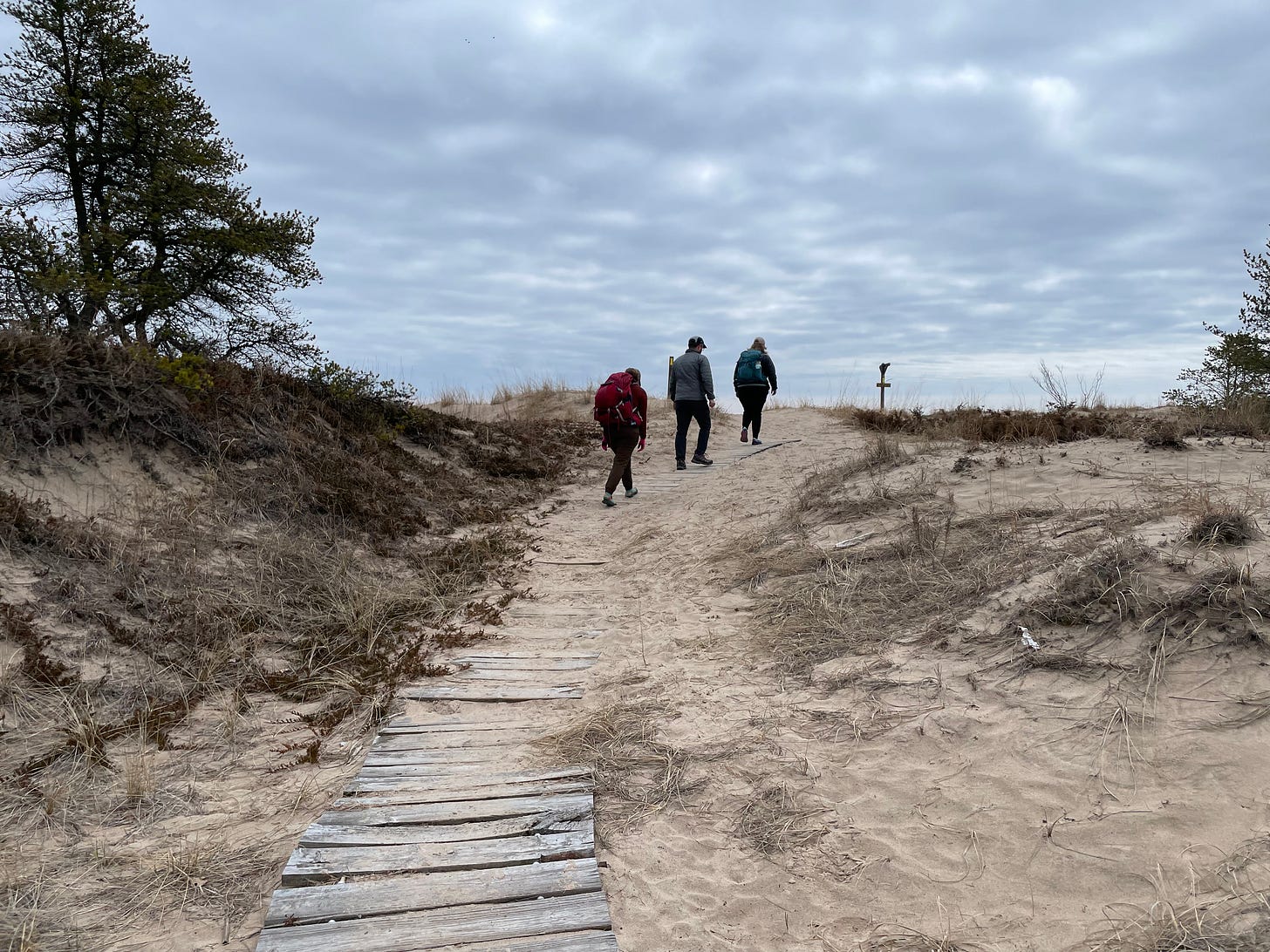Welcome back to Between A Mossy Rock And A Hard Place, the fortnightly advice column for all your outdoorsy conundrums!
Due to the popularity of the topic, this week’s column will not be paywalled. I hope you all find your outdoorsy community (and that when you do, you consider recommending this newsletter to your new friends)!
This week’s question was submitted anonymously (and you can submit your own via an easy online form):
None of my friends are interesting in camping and I’m too nervous to go alone. You’ve written about making friends by volunteering, but the one time I went to a park clean up, I was the only person there who wasn’t retired. Anywhere else I can meet people who might invite me to go hiking and camping with them?
No matter what the hobby is, there is always a struggle to find your community when you are first getting started. While you may be able to drag a friend along as moral support to a book club or board game night that they don’t really care about, it’s a much harder sell to ask them to spend the night (or more!) in the woods with you.
Though I have a decent list of suggestions for where to find other people interested in the outdoors, I caution you to not treat it as a checklist. Instead, choose two or three of the ideas and try to become a regular at those locations or events. It’s easier when you see the same people over and over and can gradually get to know them.
If the only options near you are for one-off events, be bold and chatty! Create a basic business card with your name and email address—ideally with an outdoors motif on it to help jog people’s memories—that you can pass out when you have a great conversation with someone. Expect a low response rate, but low is not zero. I did this when I joined a weekly board game group a decade ago and many of those friendships have lasted!
Also, don’t write off the retirees (or anyone else outside of your age bracket) that you meet at outdoorsy events—some of my dearest trail friends are 15+ years older than me! Since they have retired early and are either childfree or have grown children, their schedules offer more flexibility than friends my age who are wrangling young kids and a career.
With those caveats put forth, now let’s talk about 10 ways to find your own group of outdoorsy friends:
Meetup Groups: Search meetup.com for hiking groups in your area and check the past events tabs to choose one that meets on a regular basis. Don’t limit yourself to just the nearest hikes to your zip code—if you’re normally happy to drive an hour to a trailhead, use that as your radius. Your hiking friends don’t have to live in the same city or town as you because you can always meet up at the trail, instead of carpooling. If Meetup isn’t popular in your area, peruse Facebook groups or events on Eventbrite.
Ranger Hikes: Check the event calendar for your favorite state or county park to see if they offer ranger-led hikes. Even if they don’t schedule them weekly or monthly, there’s a good chance they will offer guided hikes on popular trail days. The big ones are First Day Hikes (January 1), National Trails Day (first Saturday in June), and National Public Lands Day (fourth Saturday of September), however full moons, uncommon astronomical events, and solstices are also prime time for a ranger-led hike! These events may not always be promoted online, so stop in at or call the visitor center to ask about their upcoming programming.
Presentations by “Friends of” Groups: Beyond their volunteer maintenance work, many “Friends of” groups associated with a park or trail organize nature talks. Whether or not you are passionate about that specific topic, the room will be filled with people who are interested in the outdoors. And who knows, maybe you will come out of a presentation with a new appreciation for frogs or prairies! If your nearby park doesn’t offer this, check the event calendar at your community center or library for any nature-adjacent topics.
Book Readings & Discussions: Is there a hot new nonfiction book related to the outdoors that is making the rounds? Recently, it has been Serviceberry by Robin Wall Kimmerer. Check to see if your local bookstore or library is bringing in the author for a reading or if the book has been chosen for a book club. Get to the event early and/or stick around afterwards for the snacks to strike up a conversation with other attendees.
Conservation Groups & Other Outdoor Nonprofits: Check the event calendar of outdoors and environmental nonprofits in your area. For example, the Natural Resources Foundation of Wisconsin offers field trips where people can hike, canoe, birdwatch, and more around the state. They even offer programs aimed towards adults in their 20s and 30s. Find a group with a mission you believe in and become a member!
Guided Camping Weekends: If you’re willing to spend more money, look into guided camping or backpacking trips. Unfortunately, I can’t give any recommendations on this because I started solo backpacking rather than pay (what I considered to be) the exorbitant prices for a guided 11 mile backpacking trip a few hours south of Chicago. However, people willing to pay for the experience are likely also solo adventurers looking for an outdoor buddy!
Volunteer Vacations: If you aren’t making friends at the volunteer opportunities near you, pick a new area to volunteer in! American Hiking Society offers Volunteer Vacations, but a cheaper alternative is to take your own vacation to a trail or park that is hosting a multi-day volunteer project. In addition to the Ice Age Trail where I volunteer, look for opportunities on the other ten National Scenic Trails, medium-to-long distance trails like the Superior Hiking Trail, or even Moosewatch at Isle Royale National Park! Choose an area you’d be happy to explore more than once, because you’ll likely have to return to the region to take full advantage of your new friendships.
Hiking-adjacent Groups: Get involved with groups that focus on other outdoor events like birdwatching, paddling, or trail running, because many outdoor enthusiasts will be involved in multiple hobbies. After all, I only got into xc-skiing because my hiking friends were too busy skiing in the winter to hike with me!
Social Media: Do you have a friend that is always posting hiking photos? It doesn’t matter how long it’s been since you talked to them, reach out! They might not invite you on their next trip, but they likely will have local suggestions for where to go and groups to join. Also, I made three hiking friends (including one who reads this newsletter!) just because I posted photos from a solo backpacking trip on Instagram and tagged the location. Someone reached out in the comments asking for a report on trail conditions because he was heading to the park the next weekend. I shared my intel, he ended up connecting me with another couple, and the four of us have been on multiple hikes together over the past few years!
Start Your Own Group: This is not the suggestion you are looking for, but I would be remiss not to include it. If you truly are coming up empty on hiking and outdoors groups in your area, create your own. Yes, it will be more work than just showing up. But if you’re wishing you could find outdoor friends, there are probably others nearby wishing the same.
Regardless of the path you choose, when you find your people, don’t forget to pay it forward down the road. If you meet a would-be camper that is looking to make friends, be friendly, share information about the outdoor groups in your area, and consider inviting them along for a day hike.
Any other ideas that I missed? Please share them in the comments!
I want your questions!
Do you need a pep talk to go on your first solo camping trip?
Perhaps you’re unsure how to tell your longtime hiking partner that your ideas of what makes an ideal trip have diverged?
Maybe you take twice as long to set up camp as your friends and want tips so you’re not the last one to sit down around the campfire?








Thank you for this! Do you have any advice for those who are severely immunocompromised and want to find community outdoors, but others aren’t willing to take precautions (like testing beforehand, masking etc).?
Great list, and what a helpful post to mark your 50th! Congratulations Alice.